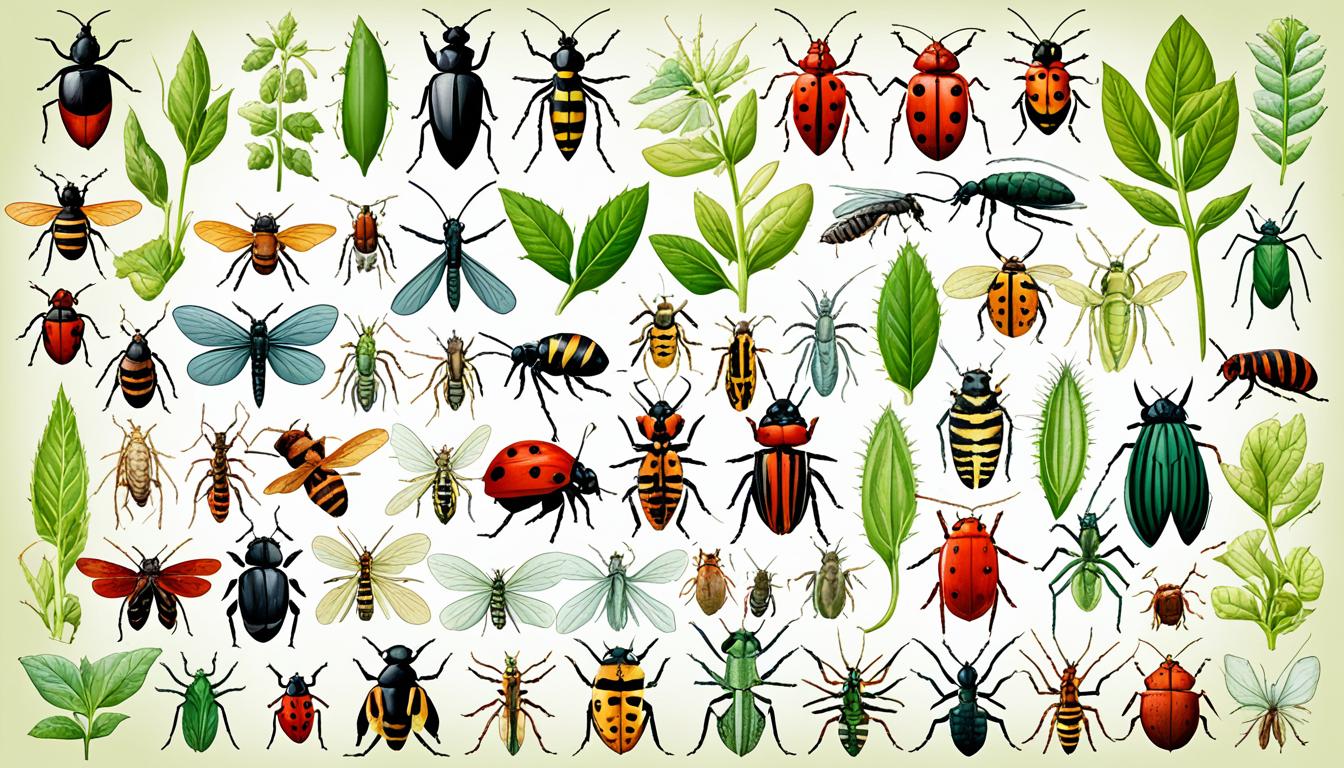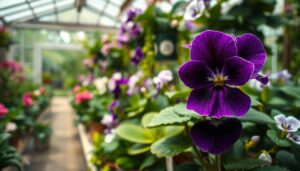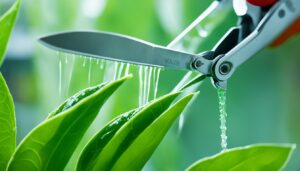Are your indoor plants struggling with mysterious infestations? Do you know how to diagnose and address common houseplant pests? This guide will give you the key knowledge to make your indoor garden lush and thriving. You’ll learn how to spot pest signs and use both non-chemical and targeted methods to control them. This way, you can keep your houseplants healthy and bright.
Dealing with pests like scale insects, mealybugs, or aphids requires knowing their life cycles and behaviors. We’ll take you through the steps of houseplant pests identification, plant disease diagnosis, and indoor plant pest control. Follow our guide to keep your indoor plants pest-free and thriving.
Introduction to Common Houseplant Pests
Growing houseplants can be fun, but it comes with challenges. One big issue is dealing with houseplant pests. These pests can slow down growth, damage leaves, and even kill plants. To overcome this, it’s important to know how to spot pest infestations and identify common houseplant insects.
Identifying Pest Infestations
It’s crucial to regularly inspect your houseplants, especially the underside of leaves. This helps you catch pests early. Look for signs like:
- Sticky residue on leaves or stems
- Webbing around the plant
- Distorted, discolored, or otherwise damaged foliage
These signs can help you spot pests like scale insects, mealybugs, aphids, and spider mites. It’s important to act fast when you see these signs. Dealing with small infestations is easier than big ones.
Learning to detect signs of houseplant pests helps protect your plants. Stay alert and act quickly if you notice any problems. This way, you can keep your plants healthy and beautiful.
Scale Insects: Persistent Pests
Houseplant lovers often battle with scale insects. These tiny pests can slowly drain the life from your plants. They blend in on stems and leaves, making them hard to see at first.
Scale insects have a life cycle that’s hard to beat. Female scale insects have “crawlers” that spread out and quickly start new colonies. This can slow down plant growth, turn leaves yellow, and even cause sooty mold to grow.
To fight scale insects, you need to use several methods. Removing them by hand is one way, but it takes a lot of work. Insecticidal soaps and horticultural oils are great for killing these pests on houseplants.
It’s important to catch scale infestations early to keep your plants healthy. With patience and the right treatments, you can get rid of these pests. This way, you can enjoy the beautiful, healthy plants you’ve taken care of.
houseplant pests identification: A Comprehensive Guide
Keeping houseplants healthy means dealing with pests like mealybugs and aphids. These pests can harm your plants. Learning how to spot and manage them is key to keeping your plants in top shape.
Mealybugs: The Cottony Culprits
Mealybugs look like tiny cotton balls and live on houseplants. They like to hang out in leaf joints and on new growth. These pests can multiply fast, laying hundreds of eggs that turn into tiny crawlers.
They leave behind a sticky mess that can attract mold. Spotting them is easy because of their white, waxy look.
To get rid of them, use a cotton swab soaked in isopropyl alcohol. Or, spray them off with water or insecticidal soap.
Aphids: Sap-Sucking Nuisances
Aphids are small, soft insects that drink plant sap. This can make leaves turn yellow and curl. They breed quickly, forming big groups that slow down plant growth.
They also leave behind sticky honeydew, which can cause mold. To fight aphids, spray them with water or insecticidal soap. Ladybugs can also help keep their numbers down.
By watching your plants closely and using safe methods, you can beat pests like mealybugs and aphids. This keeps your indoor plants healthy and beautiful.
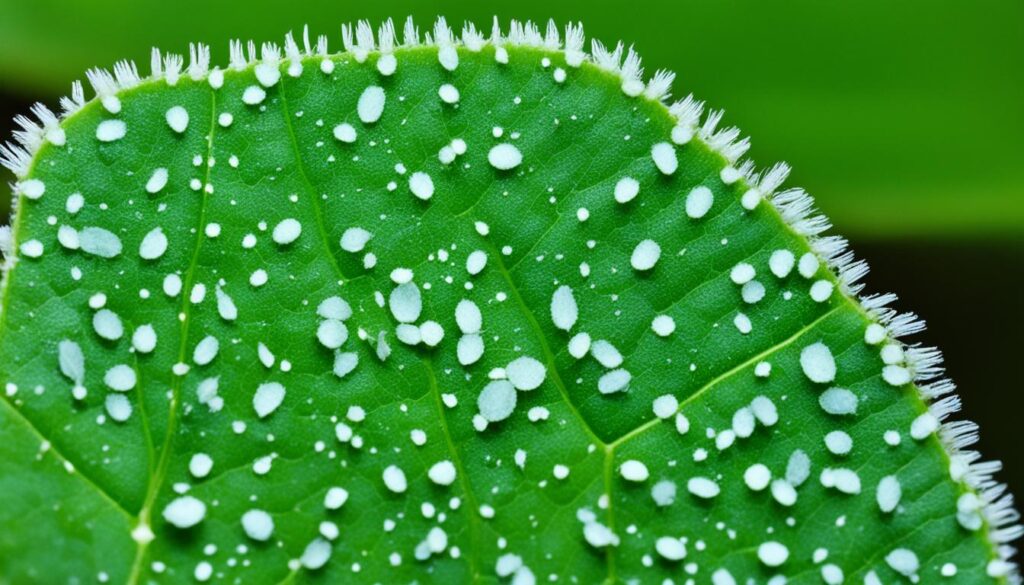
Non-Chemical Control Methods
You don’t always need harsh chemical pesticides for common houseplant pests. There are many organic pest management techniques to get rid of houseplant pests safely. These methods protect your indoor plants and your health too.
Isolating infested plants stops the pests from spreading. Then, you can remove pests like aphids and spider mites with rubbing alcohol on a cotton swab or your fingers.
- Water or homemade pest control for indoor plants like insecticidal soap can also work. Spray your plants to kill and remove pests.
- Adding beneficial insects like lacewings can help balance your garden. They provide organic pest management for potted plants.
With patience and care, you can control pests without harsh chemicals. These non-toxic methods help your plants stay healthy and safe for the environment.
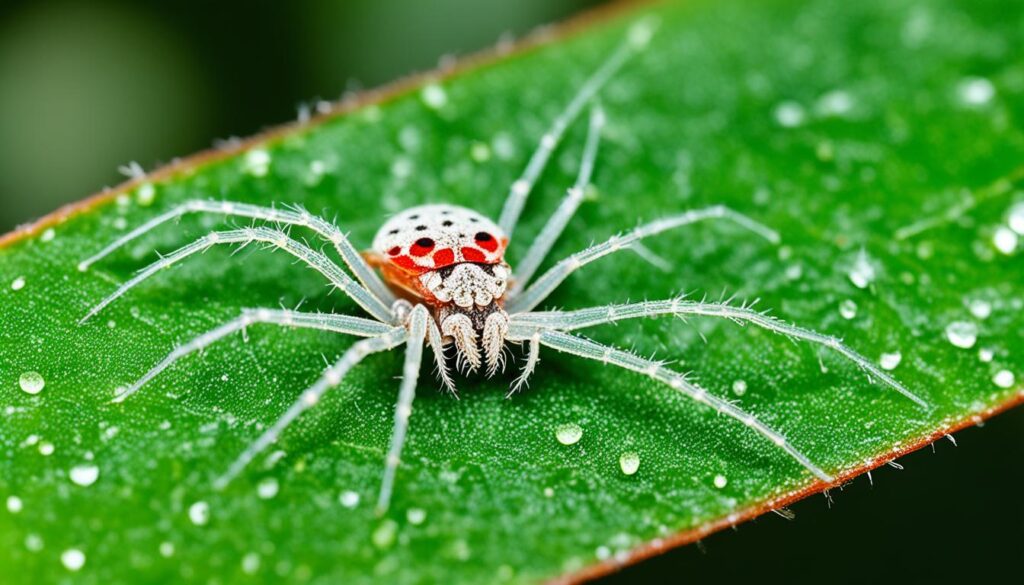
“The best pest control is prevention. Healthy, vigorous plants are less prone to pest problems.”
Conclusion
Keeping your houseplants pest-free is key to a healthy indoor garden. Learn about common pests like scale insects, mealybugs, and aphids. This knowledge helps you prevent and tackle these pests early.
Regular checks and quick action are crucial. Use both non-chemical and targeted chemical methods to control pests. This way, your houseplants can stay healthy and pest-free for a long time.
Whether you’re an expert or new to indoor gardening, caring for your plants is rewarding. Focus on caring for houseplants free of pests and maintaining a healthy indoor garden. This approach helps prevent pests and creates a peaceful, plant-filled home.
FAQ
How can I identify common houseplant pests?
Look for signs like sticky residue, webbing, and distorted leaves. Check your plants often, especially the underside of leaves. This helps catch problems early.
What are some of the most persistent and problematic houseplant pests?
Scale insects, mealybugs, and aphids are common and troublesome pests. They can slow plant growth, damage leaves, and cause sooty mold.
How can I control scale insects on my houseplants?
Use insecticidal soaps or oils to control scale insects. They can be hard to see at first, so check your plants often and act quickly.
What non-chemical methods can I use to get rid of mealybugs and aphids?
Try removing them by hand, using water sprays, or insecticidal soaps. Adding beneficial insects like lacewings can also help balance your garden.
How can I prevent future houseplant pest problems?
Regularly check your plants, isolate infested ones, and use both non-chemical and targeted chemical methods. This will help manage pests and keep your garden healthy.


